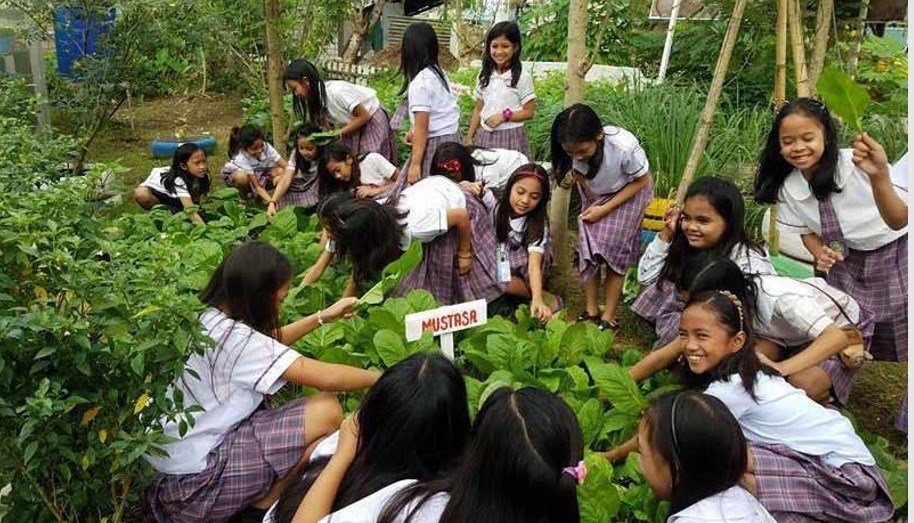
Grade school pupils are able to eat nutritious vegetables, learn farming, and find work fulfilment from the School+Home Garden Program. | SEARCA photo
CEBU CITY, Philippines—With travel restrictions being put in place by the government as a measure to contain the spread of the Coronavirus Disease 2019 (Covid-19), a school plus home garden project could help address food security concerns in urban areas.
The Southeast Asian Regional Center for Graduate Study and Research in Agriculture (SEARCA), a think –tank based inside the campus of the University of the Philippines Los Baños, initiated its School Plus Home Garden Project (S+HGP) to educate children on agriculture and to promote nutrition as well economic and overall welfare of learners.
In an emailed press release, SEARCA director Dr. Glenn B. Gregorio explained that home and school gardens could help open minds of the youth so they would appreciate farming or agri-preneurship as a potential career, business, or profession.
The S+GHP application includes homes, even in urban areas, facing food security problems particular in crises such as lockdowns.
“Incidentally, lockdowns—when people could hardly go out of their homes just to buy food— are implemented globally may lengthen indefinitely for a period of time,” the think-tank pointed out.
SEARCA is now replicating the S+GHP through partnerships, primarily with the Department of Education (DepEd). The project was piloted in six schools in Laguna and has since expanded to 28 other schools, according to SEARCA.
Under the pilot program, teachers learned to prepare cropping calendars, the sequence of plant specific crops based on good timing so harvest can be year-round. The top 10 most produced crops were mustard, pechay, okra, radish, lettuce, kulitis (amarathn), papaya, upo, patola, and talinum.
SEARCA reported that the aggregate yield in a school year reaching 1,396 kilos. The participating schools used between 19 to 77 percent of their yield for school feeding; shared to pupils and parent helpers between 0.5 to 36 percent; and sold between one to 45 percent to other parents and teachers.
The project also resulted in improved nutrition among the students of participating schools, SEARCA revealed.
DepEd Secretary Leonor M. Briones said the DepEd will explore urban-based gardening for schools in urban areas like gardening on rooftops and pots.
“Make agriculture sexy like grafting. That is very interesting, kasi may (application) ng science iyan (Science has an application on that). Hindi ka lang nagtatanim at gumagawa ng (You are not just planting and making) organic fertilizers,” she added.
Briones noted that there are existing schools with little farms and school sites bigger in size and even have tilapia farms.
SEARCA is also open to partnering with other institutions, even in urban areas, that recognize the importance of keeping their own food gardens for food and sustainability, among other purposes.
Local government units could also provide funds for a more unified, area-wide home gardening based on S+HGP.
“S+HGP promotes year-round production of nutritious food from both the school and home gardens… and (involving) LGUs to allocate funds, providing capacity building initiatives and services to maintain the school gardens or helping parents establish home gardens,” SEARCA pointed out. /bmjo